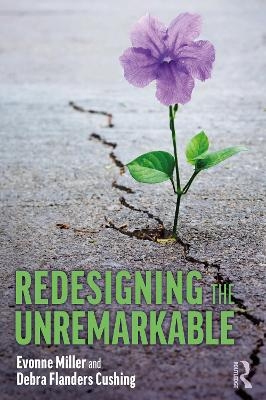
Redesigning the Unremarkable
Routledge (Verlag)
978-0-367-51189-0 (ISBN)
Redesigning the Unremarkable is a timely and necessary reminder that the often neglected elements and spaces of our built environment – from trash bins, seats, stairways, and fences to streets, bikeways, underpasses, parking lots, and shopping centres – must be thoughtfully redesigned to enhance human and planetary health. Using the lens of sustainable, salutogenic, and playable design, in this inspiring book, Miller and Cushing explore the challenges, opportunities, and importance of redesigning the unremarkable. Drawing on global research, theory, practical case studies, photographs, and personal experiences, Redesigning the Unremarkable is a vital text – a doer’s guide – for researchers, policymakers, and practitioners wanting to transform and positively reimagine our urban environment.
Evonne Miller is Professor of Design Psychology and Director of the QUT Design Lab, at Queensland University of Technology in Brisbane, Australia. With research expertise in participatory co-design and design for health, her previous books include Creating Great Places: Evidence-based Urban Design for Health and Wellbeing (2020, with Cushing) and Creative Arts-Based Research in Aged Care: Photovoice, Photography and Poetry in Action (2021), both published by Routledge. Debra Flanders Cushing is Associate Professor in Landscape Architecture in the School of Architecture and Built Environment at Queensland University of Technology. Her research combines her interest in healthy and supportive environments for young people and intergenerational populations, with her understanding of using design theory and research evidence to create sustainable and vibrant landscapes. She uses environmental psychology theory and placemaking principles to evaluate and understand the design of cities and outdoor spaces and is the author of Creating Great Places: Evidence-based Urban Design for Health and Wellbeing (2020, with Miller).
1. Why focus on the unremarkable?; Section I: Unremarkable elements; 2. Throwing out: Redesigning trash bins and landfills to be more remarkable; 3. Sitting down: Redesigning benches and chairs to be more remarkable; 4. Moving up: Redesigning stairs to be more remarkable; 5. Blocking out: Redesigning walls and fences to be more remarkable; Section II: Unremarkable spaces; 6. Passing under: Redesigning underpasses to be more remarkable; 7. Strolling along: Redesigning streets and sidewalks to be more remarkable; 8. Going places: Redesigning bikeways and multi-use trails to be more remarkable; 9. Staying put: Redesigning parking lots to be more remarkable; 10. Spending time and money: Redesigning shopping centres to be more remarkable; Conclusion: Redesigning the unremarkable – thinking differently
| Erscheinungsdatum | 20.07.2023 |
|---|---|
| Zusatzinfo | 3 Tables, black and white; 46 Halftones, black and white; 46 Illustrations, black and white |
| Verlagsort | London |
| Sprache | englisch |
| Maße | 156 x 234 mm |
| Gewicht | 358 g |
| Themenwelt | Naturwissenschaften ► Biologie ► Ökologie / Naturschutz |
| Naturwissenschaften ► Geowissenschaften ► Geografie / Kartografie | |
| Sozialwissenschaften ► Soziologie | |
| Technik ► Umwelttechnik / Biotechnologie | |
| ISBN-10 | 0-367-51189-4 / 0367511894 |
| ISBN-13 | 978-0-367-51189-0 / 9780367511890 |
| Zustand | Neuware |
| Haben Sie eine Frage zum Produkt? |
aus dem Bereich


